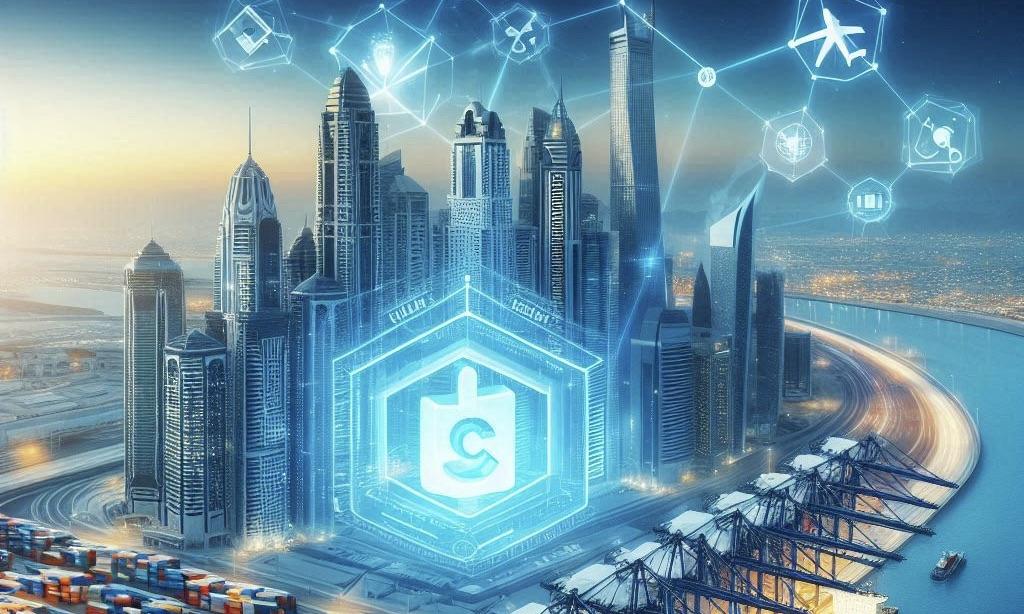Dubai Customs has launched a new blockchain platform to reduce supply chain friction and enhance data transparency. This initiative is part of Dubai's broader strategy to establish itself as a leading smart city and global trade hub, according to a July 8 statement.
Dubai Customs Launches Blockchain Platform to Enhance Trade Efficiency and Strengthen Smart City Vision
Dubai Customs says the blockchain solution is expected to simplify tamper-proof data sharing, reduce the amount of documentation for local supply chains, and save time and effort.
Dubai Customs has announced the introduction of a new blockchain platform designed to alleviate supply chain friction both within and across its borders.
In a July 8 statement, the Dubai Media Office announced (via Cointelegraph) that the blockchain solution was implemented as part of a more comprehensive strategy to solidify Dubai's status as a premier "smart" city.
“This innovation reflects our vision to make Dubai a global hub for trade and logistics,” said Ahmed bin Sulayem, Chairman of the Ports, Customs, and Free Zone Corporation.
“We believe that adopting modern technologies like blockchain will significantly contribute to improving the business environment and enhancing Dubai’s position as a major center for global trade.”
Bin Sulayem observed that the blockchain solution is designed to streamline numerous procedures, reducing time and effort in expediting commercial transactions and customs clearance.
Dubai's Blockchain Platform to Enhance Supply Chain Transparency and Reduce Documentation Complexity
Additionally, it will enhance supply chain transparency by streamlining the voluminous documentation typically associated with these processes and enabling tamper-proof data sharing.
“The goal is to make the business environment in Dubai smoother, more streamlined, and transparent,” said Dr. Abdullah Busnad, Director General of Dubai Customs.
For an extended period, blockchains have been promoted as a solution for monitoring the real-time movement of items in supply chains and preventing fraud and counterfeiting.
Nevertheless, academics in 2022 contended that widespread adoption still has obstacles. In November 2022, IBM discontinued a highly anticipated blockchain supply chain platform.
IBM and its partner, Danish logistics firm Maersk, identified a shortage of "global industry collaboration" as a significant factor in their decision to discontinue TradesLens.
In the present day, there are a plethora of additional platforms and blockchains.
VeChain, a blockchain compatible with smart contracts and utilized for supply-chain monitoring, has participated in the industry since its inception in 2016. Since its inception in 2019, Chainlink has been implemented for supply chain automation. The Global Shipping Business Network (GSBN), headquartered in Hong Kong, has also emerged as a significant participant in the blockchain supply chain sector.
VeChain, a blockchain compatible with smart contracts and utilized for supply-chain monitoring, has participated in the industry since its inception in 2016. Since its inception in 2019, Chainlink has been implemented for supply chain automation. The Global Shipping Business Network (GSBN), headquartered in Hong Kong, has also emerged as a significant participant in the blockchain supply chain sector.
In January 2020, Dubai Customers also implemented a blockchain-based platform to facilitate cross-border e-commerce.
Photo: Microsoft Bing



 SoftBank and Intel Partner to Develop Next-Generation Memory Chips for AI Data Centers
SoftBank and Intel Partner to Develop Next-Generation Memory Chips for AI Data Centers  Palantir Stock Jumps After Strong Q4 Earnings Beat and Upbeat 2026 Revenue Forecast
Palantir Stock Jumps After Strong Q4 Earnings Beat and Upbeat 2026 Revenue Forecast  Nvidia Confirms Major OpenAI Investment Amid AI Funding Race
Nvidia Confirms Major OpenAI Investment Amid AI Funding Race  AMD Shares Slide Despite Earnings Beat as Cautious Revenue Outlook Weighs on Stock
AMD Shares Slide Despite Earnings Beat as Cautious Revenue Outlook Weighs on Stock  Nvidia CEO Jensen Huang Says AI Investment Boom Is Just Beginning as NVDA Shares Surge
Nvidia CEO Jensen Huang Says AI Investment Boom Is Just Beginning as NVDA Shares Surge  Elon Musk’s Empire: SpaceX, Tesla, and xAI Merger Talks Spark Investor Debate
Elon Musk’s Empire: SpaceX, Tesla, and xAI Merger Talks Spark Investor Debate  Alphabet’s Massive AI Spending Surge Signals Confidence in Google’s Growth Engine
Alphabet’s Massive AI Spending Surge Signals Confidence in Google’s Growth Engine  SpaceX Seeks FCC Approval for Massive Solar-Powered Satellite Network to Support AI Data Centers
SpaceX Seeks FCC Approval for Massive Solar-Powered Satellite Network to Support AI Data Centers  SpaceX Prioritizes Moon Mission Before Mars as Starship Development Accelerates
SpaceX Prioritizes Moon Mission Before Mars as Starship Development Accelerates 































